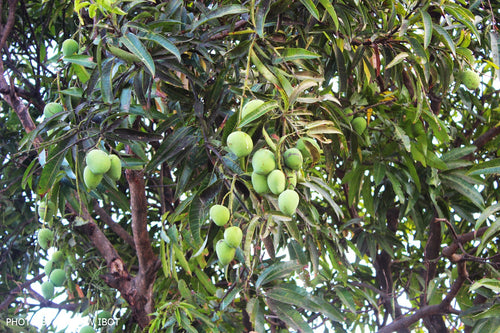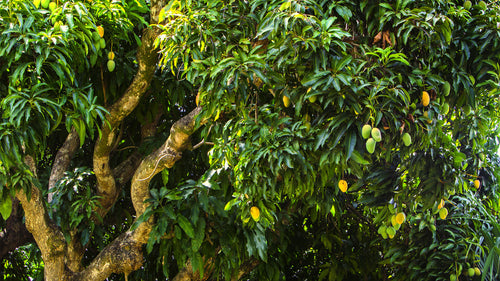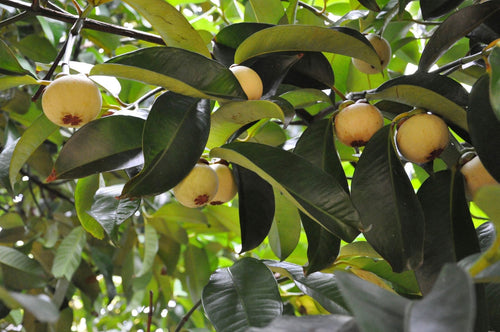DWS Fosters Employee Engagement Through Tree Plantation Initiative
DWS recently organized an exciting employee engagement activity focused on tree plantation in an agroforestry format. Employees participated in planti Read more
Project Update 3
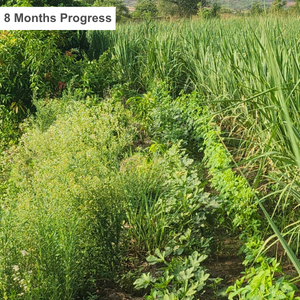
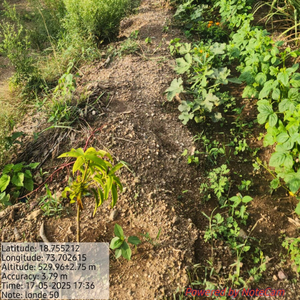
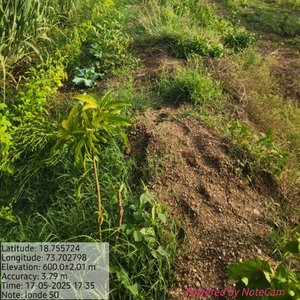
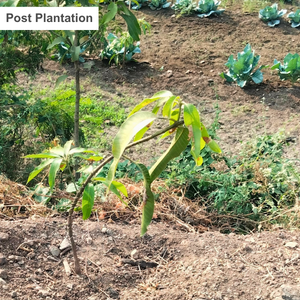
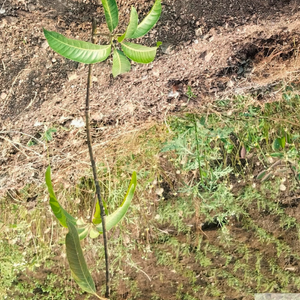
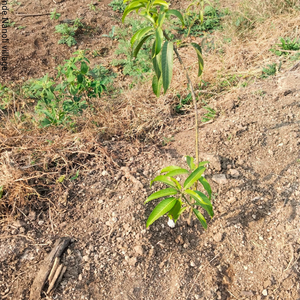
Project Update 2
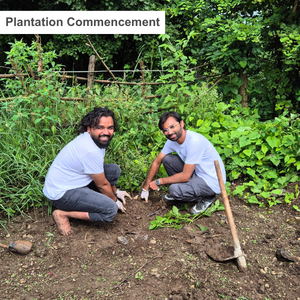
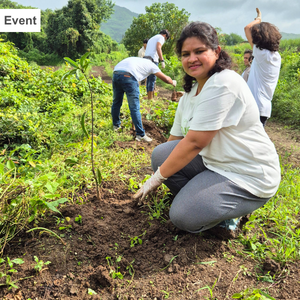
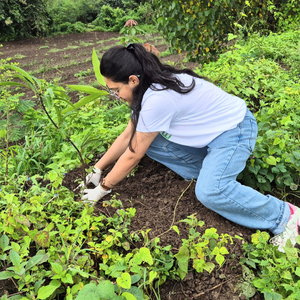
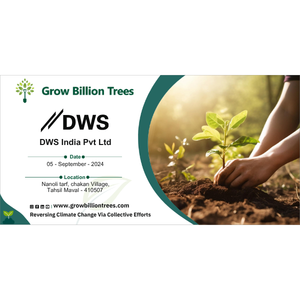

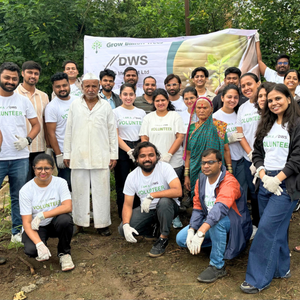
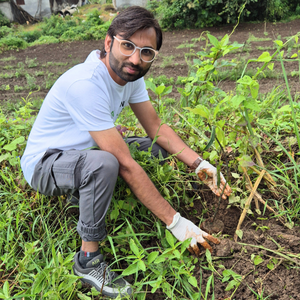
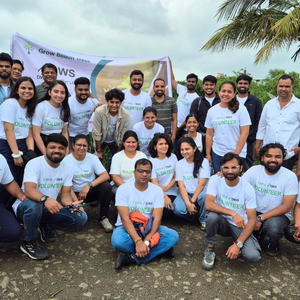
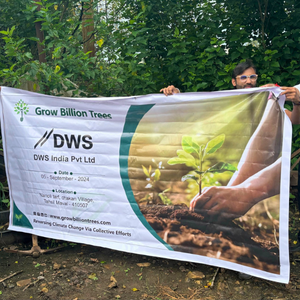

Project Update 1
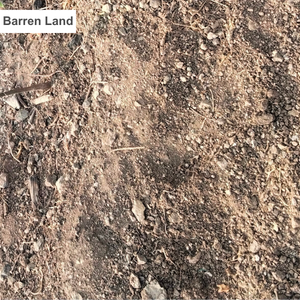
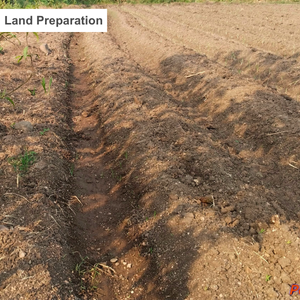
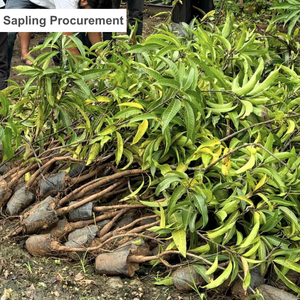
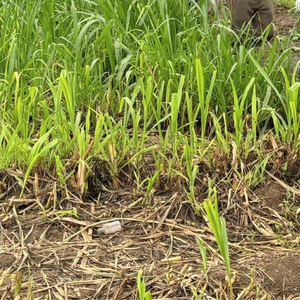
Digital Forest
Forest with 50 Trees planned
Want to plant your tree now?
Plant a Tree @ 299Trees Planted
DWS Fosters Employee Engagement Through Tree Plantation Initiative
DWS recently organized an exciting employee engagement activity focused on tree plantation in an agroforestry format. Employees participated in planting a mix of fruit-bearing and native trees alongside crops, promoting biodiversity and sustainable land use. This initiative not only strengthened team spirit but also contributed to environmental conservation and long-term community benefits. By involving staff in hands-on agroforestry practices, DWS reinforced its commitment to ecological sustainability while creating a green legacy for future generations. The initiative served as a perfect blend of team building, environmental action, and corporate responsibility.
At the heart of the initiative lies agroforestry, a transformative approach that economically empowers farmers and strengthens their livelihoods by creating long-term income opportunities through fruit-bearing trees. This integrated model combines the benefits of agriculture and forestry to build a more sustainable and resilient land-use system. Incorporating trees alongside conventional crops enhances soil health, boosts biodiversity, conserves water resources, and fosters an ecologically balanced farming ecosystem.
Project Planning & Execution
No of Trees: 50
Plantation Location: Chinchwad - Akurdi Link Rd, Induri, Nanoli Tarf Chakan, Pune, Maharashtra 410507
Plantation Date: 5th September 2024
Name of Species: Mango
Species Selection & Its Benefits:
The initiative prioritizes the planting of native and regionally suitable tree species, ensuring high survival rates and fostering long-term ecological stability. By aligning tree selection with the farmer’s needs and local market demand, the project promotes environmental sustainability while offering a reliable source of long-term income. The farmer's consent and active involvement were crucial in selecting the tree species, ensuring seamless integration with existing agricultural practices.
For this initiative, a single farmer was supported with the plantation of 50 fruit trees, comprising Mango (Mangifera indica). Mango was selected for its strong market demand, long-term profitability, and ability to thrive in the region’s agro-climatic conditions.
This thoughtful species selection was made with the farmer’s active participation and consent, ensuring compatibility with existing farming systems and enhancing ecological balance. This approach not only strengthens the farmer’s livelihood but also aligns with DWS’s broader commitment to environmental conservation, rural empowerment, and meaningful employee engagement.
Beneficiaries Details
|
SN |
Farmer Name |
Google Location |
Village Name |
Plot Size |
Mango Planted |
|
1 |
Santosh Londe |
Nanoli |
0.15 Acre |
50 |
This initiative has empowered Mr. Santosh Londe to adopt agroforestry, allowing them to benefit from a diversified income source, improved soil fertility, enhanced water retention, and reduced erosion. He received technical training in tree plantation, soil management, and sustainable farming techniques, with ongoing support through expert monitoring. This initiative not only strengthens environmental sustainability but also enhances the farmers’ economic stability, fostering a resilient farming model and contributing to the long-term well-being of Village Nanoli, Maharashtra.
Planting Methodology and Its Advantages
Agroforestry: DWS’s tree plantation initiative is rooted in the agroforestry concept, a sustainable land management practice that not only benefits the environment but also provides additional income for farmers. By integrating trees with agricultural landscapes, farmers can generate revenue through fruit production, reduce dependency on chemical inputs, and diversify their income streams, ensuring financial resilience for rural communities. Agroforestry enhances soil fertility, improves water retention, and prevents erosion, contributing to long-term ecological stability. It supports biodiversity, promotes natural pest control, and creates favourable microclimates that enhance agricultural productivity by regulating temperature, reducing wind impact, and providing shade.
As part of its ongoing commitment to global environmental stewardship, DWS recognizes agroforestry as a powerful strategy for carbon sequestration, ecological restoration, and sustainable land management. This approach reflects the organization’s deep-rooted commitment to healing the planet, promoting climate resilience, and empowering communities through nature-based solutions. By integrating tree plantations with agricultural landscapes, DWS actively supports a greener, healthier Earth for current and future generations.
Advantages of Agroforestry
-
Increased Farmer Incomes: This approach helps increase farmers' income by as much as threefold. Farmers benefit from diversified income sources, lifting their economic resilience.
-
Improved Livelihoods: Agroforestry enhances farmers' resilience to economic and climate-related shocks by creating more sustainable and diversified farming systems.
-
Biodiversity Promotion: Agroforestry supports a diverse range of plants and animals, creating habitats for wildlife and improving ecosystem health.
-
Environmental Sustainability: This model reduces carbon emissions and promotes sustainable land management, aligning with SDG 13 (Climate Action) and SDG 15 (Life on Land).
-
Food Security: Agroforestry enhances agricultural productivity and food availability by integrating fruit-bearing trees with crops, contributing to SDG 2 (Zero Hunger).
-
Carbon Sequestration: Trees planted through agroforestry absorb carbon dioxide, helping reduce greenhouse gas emissions.
-
Climate Resilience: Agroforestry helps mitigate climate change impacts by improving land productivity and fostering biodiversity.
-
Improved Soil and Water Management: Trees enhance soil fertility, reduce erosion, and increase water retention, resulting in more resilient farming.
Activities During Tree Plantation
The tree plantation initiative by DWS began with Local farmers meticulously preparing the 0.15-acre site at Induri by clearing unwanted vegetation, digging planting pits with proper spacing, and enriching the soil with organic compost to promote healthy root development and long-term tree survival.
Once the groundwork was complete, employees enthusiastically participated in planting and watering saplings of Mango. This hands-on engagement allowed employees to connect directly with nature, experience sustainable agricultural practices, and contribute meaningfully to ecological restoration.
The event fostered a spirit of collective environmental responsibility and deeper awareness of agroforestry’s social, economic, and ecological benefits. This collaborative effort between farmers and employees exemplified DWS’s commitment to sustainability, employee engagement, and community development.
Conclusion Elements
Impact
Direct Impact
|
Parameters |
Values |
References |
|
No. of Trees Planted |
50 |
|
|
Green Cover (Acres) |
0.15 |
|
|
Fruit Production Potential (Tons/Year) |
1.25 |
|
|
Income Generation Potential (Rs/Year) |
₹62,500 |
|
|
Carbon Sequestration Potential (KG) |
20 |
Small to medium-sized trees can sequester around 10–48 kilograms (22–106 pounds) of CO₂ annually. https://growbilliontrees.com/blogs/knowledge/how-much-co2-can-one-tree-absorb |
|
Carbon Sequestration by 50 mature trees ( Tons/year) |
1 Ton |
No. of Trees x Carbon Sequestration by 1 mature tree per year |
|
Carbon Credit Equivalent |
1 |
One carbon credit is equivalent to one tonne of carbon dioxide or the equivalent amount of another greenhouse gas. |
|
Carbon Footprint of an avg Indian Citizen (Tons/Year) |
1.8 |
|
|
Offsets Annual Carbon Footprint of (Adults) |
1 |
Carbon offset by 50 mature trees per year / Carbon Footprint of an avg Indian Citizen per year |
*This impact analysis is forward-looking (An agroforestry project matures in 3-5 years)
Indirect Impact
Community Impact
-
Empowerment of Farmers: By providing training and resources for sustainable farming practices, agroforestry equips farmers with skills to enhance productivity and adapt to environmental changes.
-
Food Security: The integration of fruit-bearing trees and crops ensures a consistent food supply, improving nutrition and reducing hunger within the community.
-
Environmental Awareness: Community involvement in tree plantation fosters a sense of responsibility for environmental conservation and promotes sustainable practices in daily life.
-
Enhanced Social Equity: Agroforestry initiatives foster enhanced social equity by empowering marginalized farmers with sustainable livelihoods, bridging economic gaps, and promoting inclusive community participation in environmental conservation efforts.
-
Resilience to Climate Change: The diverse and sustainable nature of agroforestry helps communities mitigate the impacts of climate change, including extreme weather events, by stabilizing local ecosystems.
-
Health and Well-being: Green spaces created through agroforestry improve air quality and offer a healthier environment, contributing to the physical and mental well-being of the community
Environmental Impact
-
Carbon Sequestration: Trees act as carbon sinks, absorbing significant amounts of CO2 from the atmosphere, helping to mitigate climate change and reduce greenhouse gas emissions.
-
Soil Health Improvement: Agroforestry enriches soil through organic matter from fallen leaves and roots, improving fertility, structure, and nutrient availability for crops.
-
Erosion Prevention: Tree roots stabilize the soil, reducing erosion caused by wind and water while protecting nearby agricultural fields and water bodies.
-
Biodiversity Conservation: By creating habitats for various species, agroforestry enhances biodiversity, supporting pollinators, beneficial insects, and native wildlife.
-
Water Cycle Regulation: Trees improve water retention, recharge groundwater levels, and reduce surface runoff, contributing to a more balanced and sustainable water cycle.
-
Microclimate Regulation: Agroforestry moderates temperature extremes, reduces wind speeds, and increases humidity, creating favourable conditions for crop growth and ecosystem balance.
Achievements
SDG Goals Achieved through Agroforestry
-
SDG 1: No Poverty – By integrating fruit-bearing trees into farmland, DWS’s initiative creates a sustainable income source for farmers, strengthening financial security and reducing poverty in rural areas.
-
SDG 2: Zero Hunger – The agroforestry approach improves soil health, enhances agricultural productivity, and promotes sustainable farming, ensuring long-term food security for farming communities.
-
SDG 3: Good Health and Well-Being – Tree plantations help purify the air, enhance biodiversity, and contribute to a healthier ecosystem. By reducing carbon emissions and pollutants, DWS’s tree plantation initiative supports respiratory health and overall well-being.
-
SDG 4: Quality Education – DWS supports knowledge-sharing on sustainable land management, empowering farmers with training on agroforestry techniques, conservation, and ecological restoration.
-
SDG 6: Clean Water and Sanitation – Agroforestry enhances groundwater recharge, prevents soil erosion, and reduces water runoff, contributing to better water conservation and ensuring long-term water availability.
-
SDG 8: Decent Work and Economic Growth – The initiative by DWS fosters employment opportunities in tree planting, farm management, and agro-processing, encouraging sustainable livelihoods and economic growth.
-
SDG 9: Industry, Innovation, and Infrastructure – DWS promotes sustainable agricultural infrastructure by integrating innovative farming practices, enhancing productivity while reducing environmental impact.
-
SDG 10: Reduced Inequality – By supporting marginalized farmer families, DWS’s project promotes income diversification and economic inclusion, reducing disparities in rural communities.
-
SDG 12: Responsible Consumption and Production – Sustainable agroforestry minimizes reliance on chemical inputs, promotes eco-friendly agricultural practices, and ensures responsible resource management.
-
SDG 13: Climate Action – Trees act as natural carbon sinks, mitigating climate change by absorbing CO₂, improving soil resilience, and reducing the impact of extreme weather conditions.
-
SDG 15: Life on Land – This initiative enhances biodiversity, prevents deforestation, restores degraded land, and strengthens ecosystem health through sustainable afforestation efforts.
-
SDG 17: Partnerships for the Goals – DWS’s collaboration with Grow Billion Trees highlights the significance of partnerships in driving impactful environmental and social change. Through collective expertise and community engagement, this initiative contributes to long-term sustainability and ecological restoration.
ESG Achieved through Agroforestry:
-
Environmental Impact: The DWS agroforestry initiative promotes sustainable afforestation, enhancing carbon sequestration, combating climate change, and improving air quality. By restoring soil fertility, preventing erosion, and supporting groundwater recharge, this initiative contributes to long-term ecological stability. Additionally, it fosters biodiversity by creating a thriving habitat for wildlife, reinforcing the company’s commitment to environmental conservation and responsible land management.
-
Social Impact: This initiative uplifts rural farming communities by creating additional income opportunities, enhancing food security, and building climate resilience. By integrating fruit-bearing trees into farmlands, farmers benefit economically through diversified revenue streams while reducing their reliance on single-crop agriculture. This approach lowers farming costs through natural soil enrichment, improves air and water quality, and fosters long-term environmental sustainability. The initiative also generates local employment and promotes community well-being by actively involving and educating farmers in sustainable practices thereby strengthening livelihoods and encouraging lasting environmental stewardship for all.
-
Governance Impact: The DWS collaboration with Grow Billion Trees ensures ethical governance, transparency, and measurable impact. The initiative adheres to sustainable afforestation standards, with expert-led implementation and strategic execution. By embedding accountability and responsible corporate governance into its environmental efforts, the company reinforces stakeholder trust and sets a benchmark for sustainability-driven corporate leadership.
Building Communities
One of the most profound outcomes of the DWS agroforestry initiative was the sense of unity and collaboration it nurtured within the local community. By actively involving farmers, stakeholders, and environmental partners, the initiative transformed from a simple tree plantation drive into a shared mission for a greener, more sustainable future.
-
Empowering Farmers: The Farmer was not just a beneficiary but an active participant, gaining hands-on experience in sustainable agroforestry techniques. By integrating these practices into their traditional farming methods, he strengthened his economic stability and environmental resilience, ensuring long-term benefits for his livelihood and the ecosystem.
-
Fostering Partnerships: The project encourages active participation from Mr. Santosh Londe throughout the plantation process, fostering a sense of ownership and collaboration in the community. DWS’s collaboration with Grow Billion Trees and local farming communities demonstrated the power of collective action in driving meaningful environmental change. This synergy ensured expert-led execution, long-term sustainability, and tangible positive outcomes for both people and nature.
-
Creating a Ripple Effect: As farmers witnessed the economic and ecological benefits of agroforestry firsthand, their enthusiasm encouraged neighbouring communities to adopt similar sustainable practices. This cascading effect expanded the initiative’s impact, turning a single project into a widespread movement for resilient and greener landscapes.
This initiative reaffirmed that true environmental sustainability is rooted in community-driven efforts. It was not just about planting trees; it was about planting hope, fostering collaboration, and building a shared vision for a healthier planet.
Commitment by Grow Billion Trees
-
Ensuring Tree Survivability: GBT prioritizes native species, continuous monitoring, and soil health improvement using organic fertilizers. These efforts ensure sustainable growth and benefit the farmers and communities.
-
Transparency & Accountability: GBT provides detailed reports on tree growth, survival rates, and carbon benefits, using geo-fencing and regular updates to maintain transparency and effectiveness.
-
Sustainable Plantation Efforts: GBT implements projects that balance environmental, social, and economic goals, addressing issues like urban heat islands and degraded farmlands. These efforts promote ecological balance, livelihoods, and long-term climate resilience.
-
Enhancing Ecosystem Health: By selecting native species and creating diverse habitats, GBT enhances biodiversity and ecosystem resilience, ensuring long-term ecological health and supporting wildlife.
-
Long-Term Impact: GBT’s initiatives tackle environmental challenges, enhance rural livelihoods, foster climate resilience, and promote sustainable development while reducing carbon footprints.
Acknowledgment
We at Grow Billion Trees extend our heartfelt gratitude to everyone who contributed to the success of the agroforestry plantation initiative in Induri, Nanoli Tarf Chakan in Pune, in collaboration with DWS. This project, which harmonizes environmental sustainability with community empowerment, would not have been possible without the dedication and collective efforts of key individuals.
To DWS: We sincerely appreciate your commitment to sustainability and social responsibility. Your initiative to plant 50 fruit-bearing trees has not only contributed to environmental restoration but also laid the foundation for long-term benefits for the local farming community. Your dedication to fostering a greener future is truly commendable, and we are honoured to partner with you in this meaningful endeavour.
To Mr. Santosh Londe: Your willingness to embrace agroforestry and integrate fruit-bearing trees into your farming practices has been truly commendable. This initiative not only enhances soil health but also contributes to long-term agricultural sustainability. Your commitment to improving the ecosystem while securing a better future for coming generations is inspiring. We are honoured to be part of this journey and look forward to the continued positive impact of your efforts.
To Our Ground Partners and Volunteers: Your unwavering support and commitment to environmental conservation have played a crucial role in making this project a success. Through collaboration and shared vision, we have taken a step toward a more sustainable and resilient future. Your contributions are deeply valued, and we thank you for being an essential part of this journey.
This initiative is just the beginning of our collective efforts to promote agroforestry and empower rural communities. Together, we will continue working toward a greener, more sustainable future for all.
Thank you for your unwavering commitment and support.
Closing Remarks
The successful completion of the agroforestry plantation at Induri, Nanoli Tarf Chakan in Pune, marks a meaningful step toward environmental sustainability and community empowerment. This initiative has not only contributed to the region’s green cover but has also provided long-term benefits for the farmers by integrating sustainable agricultural practices. By enhancing soil fertility and offering an additional source of income through fruit production, the initiative strengthens economic stability, ensuring lasting benefits for the farming community. It stands as a testament to how collective efforts can create a positive impact on both livelihoods and nature.
With 50 mango trees now thriving, this project will contribute to ecological restoration, biodiversity enhancement, and long-term financial support for the farmer. As we celebrate this achievement, we remain committed to promoting sustainable initiatives and encouraging more organizations to participate in similar impactful programs.
We extend our sincere appreciation to DWS, Mr. Santosh Londe of Nanoli, our partners, and all those who contributed to its commitment to sustainability by planting these trees as its global mission of healing the planet. Our gratitude also goes to our partners and everyone involved in making this vision a reality. Your dedication and contributions have been instrumental in ensuring the success of this initiative.
This is just the beginning of a broader movement towards a greener and more sustainable future. By continuing to collaborate, we can build a resilient environment and create a lasting legacy for the future.
Trees for Corporates
Trending
Most Popular
1. Agroforestry benefits
Who doesn’t love a win-win situation? That’s what agroforestry is! It's like nature’s own two-for-one deal. You plant trees, you grow crops, and voilà, both thrive. This sustainable farming technique not only boosts biodiversity but also reduces soil erosion. It's like giving Mother Nature a spa day, where she gets pampered and comes out rejuvenated. Plus, the trees absorb all that pesky carbon dioxide, making the world a little cooler – literally. So next time you enjoy that fresh air, thank an agroforest for working overtime to keep you breathing easy.
2. Carbon sequestration through trees
Imagine trees as Earth's very own vacuum cleaners, except instead of dust, they're sucking up carbon dioxide. This process, carbon sequestration, is the tree’s way of saying, “Don’t worry, I’ve got this.” While we’re busy burning fossil fuels and making things a tad too toasty, trees are silently storing carbon in their trunks, branches, and roots. The best part? They look great while doing it! So, planting trees isn’t just about aesthetics – it’s about giving Earth the tools to fix our mess. Now that’s what I call a green solution!
3. Sustainable farming with trees
Move over monoculture, there’s a new farming method in town! Sustainable farming with trees is like nature’s version of crop rotation on steroids. Instead of relying on harmful fertilizers, trees work their magic, replenishing soil nutrients and keeping pests at bay. It’s farming, but smarter. Plus, trees provide shade, which means your crops won’t wilt under the sun like an ice cream cone in summer. In short, it's farming that doesn’t just feed us – it feeds the planet too. So plant some trees, farm sustainably, and watch as your garden grows and Mother Earth smiles.
4. Tree plantation CSR initiatives
What’s better than planting trees? Planting trees and calling it CSR! Corporate Social Responsibility, that is. Tree plantation initiatives allow businesses to look good while doing good. It’s like the ultimate PR move, except instead of paying influencers, you're paying it forward to the planet. Not only do companies get eco-kudos, but they also engage employees in hands-on activities that make a real difference. So next time you see a corporation getting their hands dirty (literally), know that they’re not just planting trees – they’re planting goodwill.
5. Employee engagement through tree planting
Your coworkers bonding over saplings, chatting about life while digging holes, and, at the end of the day, everyone leaves with a sense of accomplishment. Plus, it’s great for mental health. Nothing beats the feeling of planting a tree and knowing you’ve contributed to a greener planet. So, instead of trust falls, try tree falls (planting, that is)!
6. DWS sustainable initiatives
When it comes to DWS sustainable initiatives, they don’t just talk the talk – they walk the walk. From eco-friendly projects to reducing their carbon footprint, DWS is the cool kid in the sustainability world. Their initiatives often involve tree planting as part of a bigger green plan. Whether it’s investing in renewable energy or supporting reforestation efforts, DWS is showing the world that business and sustainability can go hand in hand. They’re proving that you can be profit-driven without driving the planet into the ground. Now that’s a corporate role model we can root for!
7. Agroforest biodiversity
An agroforest is like nature’s version of a biodiversity buffet – all-you-can-grow and all-you-can-plant! In these green spaces, trees, crops, and even animals live harmoniously, creating a thriving ecosystem. Think of it as the ultimate farm-to-table experience, but for wildlife. Agroforests promote species diversity, reduce pest outbreaks, and keep ecosystems balanced. It's like planting your own little world, where every living thing has a role to play. The more, the merrier, right? So if you’re planting an agroforest, remember – you’re not just farming; you’re fostering biodiversity!
8. Tree plantation for carbon neutrality
Want to achieve carbon neutrality? Look no further than trees! These natural carbon sinks are experts at absorbing CO₂, making them the perfect partner for offsetting your carbon emissions. Whether you’re a company looking to go green or an individual aiming to reduce your footprint, tree plantations can do the heavy lifting. It’s like giving your carbon emissions a one-way ticket to nowhere. The more trees you plant, the closer you get to carbon neutrality. So, next time someone asks about your carbon footprint, just point to the nearest forest and say, “Handled!”
FAQ
What is the importance of tree plantation for the environment?
Tree plantation helps reduce air pollution, improve biodiversity, and combat climate change by absorbing carbon dioxide. Trees also provide shade, prevent soil erosion, and improve water retention, which supports sustainable ecosystems. At DWS, we believe tree plantation is essential for creating a healthier planet and improving community well-being. By planting trees, we contribute to long-term environmental sustainability, ensuring a cleaner, greener future for all.
How does agroforestry benefit farmers?
Agroforestry combines trees and crops on the same land, providing farmers with multiple sources of income. It enhances soil fertility, reduces the need for chemical inputs, and improves crop resilience to climate change. DWS encourages agroforestry as it improves land productivity while promoting environmental health, ensuring both short-term and long-term benefits for farmers.
How do trees help conserve water?
Trees reduce water runoff, increase soil moisture, and replenish groundwater by slowing down water evaporation. In agroforestry, trees act as natural barriers that prevent soil erosion and maintain water levels. DWS promotes tree planting as a key strategy in water conservation efforts, ensuring a sustainable supply of water for both agricultural and domestic use.
What is the role of DWS in promoting sustainable agroforestry?
DWS promotes sustainable agroforestry by supporting projects that integrate tree planting with farming practices. We work closely with communities to develop agroforestry systems that enhance soil quality, conserve water, and improve biodiversity. Our goal is to create resilient agricultural landscapes that support both farmers and the environment.
Which tree species are best suited for agroforestry in India?
Several drought-resistant and fast-growing trees, like Neem, Acacia, and Banyan, are ideal for agroforestry in India. These species thrive in different climatic conditions, improve soil health, and provide multiple benefits like timber, shade, and fruits. At DWS, we recommend selecting native species that are adapted to the local environment for maximum sustainability.
How does DWS ensure drinking water safety in agroforestry regions?
DWS ensures drinking water safety through the promotion of agroforestry practices that reduce runoff and filter out pollutants. Trees act as natural water filters, preventing contaminants from entering water sources. We implement agroforestry systems that protect water quality, ensuring safe and clean drinking water for communities in agroforestry regions.
Can tree plantation help mitigate climate change?
Yes, tree plantations are one of the most effective ways to combat climate change. Trees absorb carbon dioxide, a major greenhouse gas, and store it, helping to reduce the impact of global warming. At DWS, we prioritize large-scale tree planting efforts to fight climate change and promote ecological balance.
How does agroforestry enhance biodiversity?
Agroforestry systems create diverse habitats that support various species of plants, animals, and insects. The integration of trees with crops provides shelter and food for wildlife, enhancing ecosystem diversity. DWS supports agroforestry because it boosts biodiversity, which strengthens ecosystem resilience and sustainability.
Why is it important to plant native tree species?
Native tree species are well-adapted to local environmental conditions and support indigenous wildlife. They require less water, fertilizer, and care, making them more sustainable for long-term growth. At DWS, we advocate for the planting of native species to maintain ecological balance and promote biodiversity in agroforestry systems.
What are the economic benefits of agroforestry?
Agroforestry provides farmers with multiple streams of income, including timber, fruits, and crops, while reducing the need for costly chemical fertilizers. It also improves land productivity, helping farmers grow more with less. DWS promotes agroforestry as a win-win strategy for improving both the environment and farmers' livelihoods.
- Choosing a selection results in a full page refresh.
- Opens in a new window.


